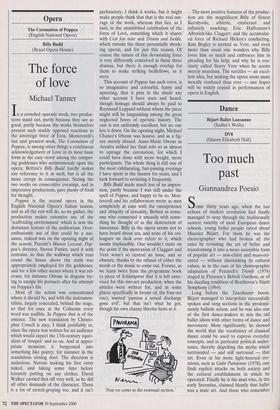Opera
The Coronation of Poppea (English National Opera) Billy Budd (Royal Opera House)
The force of love
Michael Tanner
In a crowded operatic week, two produc- tions stand out, partly because they are so good, partly because the works themselves present such starkly opposed reactions to the sovereign force of Eros. Monteverdi's last and greatest work, The Coronation of Poppea, is among other things a continuous acknowledgement of Love in its most basic form as the easy victor among the compet- ing goddesses who acrimoniously open the opera; Britten's Billy Budd hardly makes any reference to it as such, but is all the more creepy in consequence. Seeing the two works on consecutive evenings, and in impressive productions, gave plenty of food for thought.
Poppea is the second opera in the English National Opera's Italian season, and as all the rest will do, so we gather, the production makes extensive use of the `scaffolding environment' which is now the dominant feature of the auditorium. Over- enthusiastic use of that could be a nui- sance, indeed was on the opening night of the season, Puccini's Manon Lescaut. Pop- pea's director, Steven Pimlot, used it with restraint, so that the walkway which runs round the house above the stalls was appropriately employed for the goddesses, and for a few other scenes where it was rel- evant; for instance Ottone in disguise try- ing to escape his pursuers after his attempt on Poppea's life.
Most of the action was concentrated where it should be, and with the instrumen- talists, largely concealed, behind the stage, so that for once at the Coliseum every word was audible. In Poppea that is of the essence. The new translation by Christo- pher Cowell is racy, I think justifiably so, since the opera was written for an audience which would expect the 17th-century equiv- alent of `tosspot' and so on. And at appro- priate moments it burgeoned into something like poetry; for instance in the scandalous closing duet. The direction is audacious, Nerone making his first entry naked, and taking some time before leisurely putting on any clothes. David Walker carried that off very well, as he did all other demands of the character. There is a lot of crotch-groping too, and it isn't perfunctory; I think it works, but it might make people think that that is the real out- rage of the work, whereas that lies, as I said, in the uninhibited celebration of the force of Love, something which it shares with Cosi fan tutte and Tristan and Isolde, which remain the three perennially shock- ing operas, and for just this reason. Of course the nature of this devastating force is very differently conceived in these three dramas, but there is enough overlap for them to make striking bedfellows, as it were.
This account of Poppea has such verve, is so imaginative and colourful, funny and upsetting, that it puts in the shade any other account I have seen and heard, though homage should always be paid to Raymond Leppard without whom the piece might still be languishing among the great neglected bores of operatic history. The cast is not uniformly excellent, but no one lets it down. On the opening night, Michael Chance's Ottone was hoarse, and as a fig- ure merely absurd. Anne-Marie Owens as Arnalta milked her final solo so as almost to upstage the coronation, for which I could have done with more weight, more participants. The whole thing is still one of the most exhilarating, fast-passing evenings I have spent in the theatre for years, and I look forward to revisiting it frequently.
Bil.4? Budd made much less of an impres- sion, partly because I was still under the spell of Poppea, and happy to be so. Mon- teverdi and his collaborators wrote as men completely at ease with the omnipotence and ubiquity of sexuality, Britten as some- one who connected it uneasily with some- thing he thought of as the destruction of innocence. Billy in the opera seems not to have heard about sex, and none of his col- leagues on deck ever refers to it, which seems implausible. One wouldn't insist on the point if the motivation of Claggart and Vere wasn't so central an issue, and so obscure, thanks to the refusal of either the words or the music to come out. Forster, as we learn twice from the programme book (a piece of Schlamperei that it is left unre- vised for this two-act production, when the articles were written for, and in some places specifically in favour of, the four-act one), wanted 'passion a sexual discharge gone evil', but that isn't what he got, though his own clumsy libretto hints at it.
Wert we come to the swimsuit section.'
The most positive features of the produc- tion are the magnificent Billy of Simon Keenlyside, athletic, exuberant and infinitely touching; Eric Halfvarson's Alberich-like Claggart; and the accumulat- ed force of Richard Hickox's conducting. Kim Begley is neutral as Vere, and even more than usual one wonders why Billy loves him so much and embraces him in pleading for his help; and why he is rou- tinely called Starry Vere when he seems merely mundane. The surtitics — an excel- lent idea, but making the opera seem more morally confused than ever — one hopes will be widely copied in performances of opera in English.


























































































 Previous page
Previous page